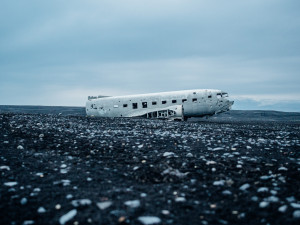It was well into summer when I started to lose my grasp on the splintering pieces. On my lunch break, I would drive to a large parking lot for a big box store and cry until I thought I might throw up, and I couldn’t breathe. Even then, I used a wet wipe to compose my features. “Get it together,” I said to my reflection in the visor mirror. Then I would drive back to work, heavy in the knowledge that things might never change.
I’d always prided myself on my ability to hold it together. “You can’t change your circumstances,” my mother would say, “but you can change your attitude.” My six year old self drank in those words, and didn’t realize that certain circumstances were not okay, no matter my attitude.
So I tried to change my attitude, using all of my tricks. I went to yoga at lunch and bought scented candles for my office. I read books instead of talking with my co-workers. But the days continued to roll over me, crushing my spirit a little more every day. My job was slowly killing me.
It started subtly. On the way to work I wondered what it might be like to drive off the ridge near my house. One small movement of the steering wheel, one gentle push over the edge. Or perhaps I could drive into the median. Nothing serious, just an accident. If I was in the hospital, I couldn’t go to work, right?
I’ll never forget where I was and how it felt. I was in my office, at my desk, the one right next to the window that looked over the parking lot. It was hot in the building, and my fan was on, pointed at my hands, hovering over the keyboard. An image entered my mind unexpectedly. I pictured myself walking into the kitchen and opening the drawer where we kept the knives, selecting one, and plunging it into my chest.
The room began to close in and I began to shake. I couldn’t breathe. I couldn’t focus. I’m not sure how I made it through the rest of that day and home. I’m even less sure how I made it to the home of my small group leader.
 All through the evening, as the other members of my group discussed the Bible in that small, cozy home to a single mother and three foster kids, I stayed silent. I was afraid to move or speak, because I knew that I could no longer keep it together. My next move would be the end, I would fall apart. I waited as long as I could.
All through the evening, as the other members of my group discussed the Bible in that small, cozy home to a single mother and three foster kids, I stayed silent. I was afraid to move or speak, because I knew that I could no longer keep it together. My next move would be the end, I would fall apart. I waited as long as I could.
After group was over and we continued to talk, I raised a timid voice. “Can I ask for prayer?” I said.
I sat on the large ottoman in the center of the room, legs crossed. I wasn’t sure how to begin. How do you fracture the image of togetherness? How do you admit that you want to die, and that you are terrified?
It wasn’t the sort of small group that talked about personal struggle. All the prayer requests around the circle were about other people, and physical health. I wasn’t sure if it was a safe place to fall apart, even as I shattered. But I couldn’t hold it in any longer.
There was silence for a time, after my flood of broken words. I waited for the clatter. Hugging my knees into my chest. But it didn’t come.
“Let’s start with therapy,” one of the women said.
“I can call and get you a doctor’s appointment,” said another.
I’ll have lunch with you tomorrow,” said another voice. “I’ll come get you at work.”
“You can quit your job,” said the single mom with the three foster kids.
In the days and weeks that followed that night, I began therapy, went to the doctor, quit my job, and almost jumped out a window high above downtown Denver. Often, after I stopped working and began to heal, I would stare at the wall, trying to muster the energy to drink the tea after I’d made it.
But I returned often to that tiny house, and that warm living room, even to that large, cushy ottoman. I awoke my memories of that circle of people around me, reminding me that I wasn’t alone, even if I wasn’t together.